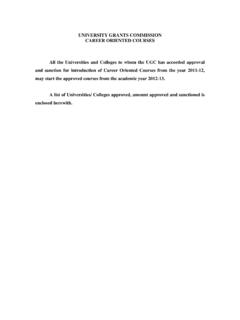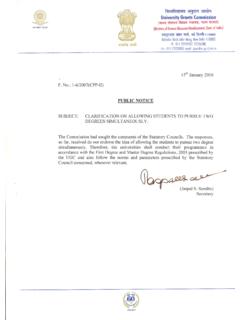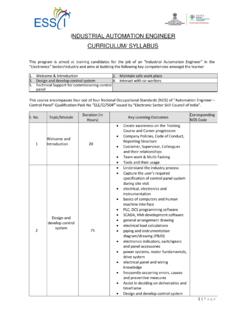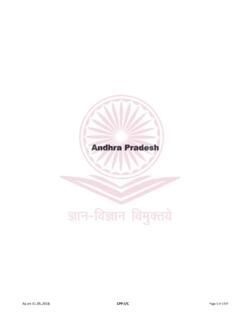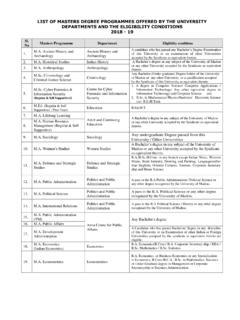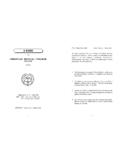Transcription of University Grants Commission Research Project for …
1 1 University Grants Commission Research Project for Teachers XII Plan guidelines (2012-2017) University Grants Commission BAHADUR SHAH ZAFAR MARG NEW DELHI 110 002 E-Mail : website: 2 University Grants Commission 12th PLAN GUIDELINES FOR PROVIDING Grants TO University /COLLEGE TEACHERS FOR MAJOR Research Project 1. INTRODUCTION The University Grants Commission strives to promote teaching and Research in emerging areas in Humanities, Social Sciences, Languages, Literature, Pure sciences, Engineering & Technology, Pharmacy, Medical, Agricultural Sciences etc. The emphasis would be supporting such areas that cut across disciplines and subjects such as health, gerontology, environment, biotechnology, nanotechnology, stress management, WTO and its impact on economy, history of science, Asian philosophy and many other areas as would be identified by subject experts. There are disciplines such as defence and strategic studies which include national security affairs, insurance and banking, economics and world trade which in a true sense are multidisciplinary in nature, cutting across disciplines of sciences, humanities and social sciences, and are of importance in a rapidly changing global scenario.
2 These and allied disciplines need to be studied and researched in a more organized manner. Institutionalization of such activities is a need of the present times. 2. OBJECTIVES The universities have been the centres of Research . Although, the G overnment has a ne twork of science and technology laboratories for Research and development, the major base of researchers in science and technolog y remains with t he univ ersities and colleges. Hence, unive rsity and college teachers need to be supported to meet their requir ements for individual Research in specialized areas. To promote excellence in Research in higher edu cation by supporting Research programmes of University and College teachers in various disciplines. 3. ELIGIBILITY/TARGET GROUP: The University Grants Commission will pr ovide support to perm anent/regular, working/retired teachers in the Universities and Colleges (Under Section 2(f) and 12 B of UGC Act, 1956) only. The permanent teachers working in self financing In stitutions [Self financing colleges subject to fulfilment of conditions stipulated in the UGC (Fitnes s of Instit ution for grant Rules, 1975) and subject to the condition that fees charged by such colleges are in accordance with the State/ University fee regulations or as laid down by any law in force also eligible to apply under the scheme.]
3 A teacher, working or retired can avail only one Project / scheme of the UGC at any given time. The one, which is offered and accepted first irrespective of Principal Investigator/Co-Investigator, must be completed before the other offer is accepted. Failure to abide b y this rule shall make the Principal Investigator/Co-Investigator and the Institution liable to refund the entire amount paid by the UGC in all such schemes. They may be also debarred from participation in future UGC programmes. It would be the responsibility of the Principal Investigator/Co-Investigator and the host Institution for total accountability of the Project . After completion of one Project (date of finalization of accounts of the Project ). If a teacher desires to undertake another UGC Project , a gap of one year will be necessary. The Principal Investigator should publish two papers in a reputed journal in the form of 3 Books/Article/Presentation in seminar etc.
4 From the said Project completed. Retired teachers can apply under the scheme up to the age of 67 years and must have a Co-Investigator (Permanent Teacher) from the same Department, where the Project is likely to be undertaken. Only the teaching faculty of Library Science, Physical Education, Principals and Vice-Chancellors will also be eligible to participate in the scheme. Colleges/Universities/ Institutions forwarding the proposal should have a dequate r esearch facilities. 4. NATURE OF ASSISTANCE: The quantum of assistance for a Research Project will be as under: Major Research Project in Scie nces including Engineering & T echnology, Medical, Pharmacy Agriculture etc. - Rs. lacs. Major Research Project in Humanities, Social Science, Languages, Literature, Arts, Law and allied disciplines - Rs. lacs. The Commission will provide financial support for the items like Equipment, Books and Journals, ( Project Fellow), Hiring Services, Contingency, Chemicals and Consumables, Travel and Field work.
5 Non-Recurring Grants a. Equipment b. Books and Journals The equipment as well as books & journals Grants may be utilized to procure the essential equipments and books & journals needed for the proposed Research work. The escalation, if any, in the cost of approved equipment may be met out of savings/re-appropriation from Non-recurring head only with the approval of Principal/ Registrar of the college/ University under intimation to the Commission . The equipments and books & journals acquired by the Principal Investigator under a Major Research Project must be deposited to University / College/Institution or in the departmental library or the central library after the completion of the Project which will be the institutional property. The University /colleges/Institution should make every effort to put all the equipment available in the laboratories in effective use.
6 Recurring Grants a. Honorarium to Retired Teachers Honorarium to retired teachers is admissible at the rate of ,000/- upto the age of 70 years. If the Principal Investigator attains the age of 70 years during middle of the tenure of the Project and some more work needs to be done, the Principal Investigator should complete the work without any honorarium for the rest of the period. If a teacher retires during the tenure of the Project , he/she will also be eligible for honorarium on receipt of an affidavit indicating his/her date of birth, date of superannuation and that he/she is not employed anywhere or is not drawing 4 honorarium from any other Government/Non-Government organization, duly oath commissioned and witnessed by the Registrar/Principal/Director of the University /College/Institute. b Project Fellow Project Fellow may be appointed with a consolidated fellowship of: i) NET/GATE qualified-Rs. 16,000/- for initial 2 years and Rs.
7 18,000/- for the third year. ii) Non-GATE/Non-NET- Rs. 14,000/- for initial 2 years and Rs. 16,000/- for the third year. The person to be considered for appointment as Project Fellow must have second class master degree with a minimum of 55% marks for general category (50% in case of SC/ST/PH) or in the subject concerned or a related subject. The candidate to be appointed as Project Fellow should be below the age of 40 years at the time of appointment. The Project Fellow should do work full tim e in the Project and ge t the fellowship f rom one source only. The Retired Principal Investigators are not entitled for Project Fellow. They should do work full time Research . HRA Suitable hostel type accommodation may be provided for Project Fellow failing which they are eligible for HRA as per rules of the University /Institution. Project Fellow who has been provided accommodation in a hostel recognized/ maintained by the Institution may be reimbursed the hostel fee.
8 Leave The Fe male Project Fellows would be eligible for maternity leave at full rates for a period not exceeding four months once only during the tenure of MRP. Project fellows will not be entitled to avail vacations, , summer, winter and pooja etc. MEDICAL FACILITIES Project fellow may be provided medical facilities as per rules of the University /Institution. However, the UGC will not provide any financial assistance on this account. MODE OF SELECTION The selection of the Project Fellow may be made by an open selection through a duly constituted Selection Committee. The constitution of the Selection Committee will be as under: 1 Head of the Department will act as Chairperson 2 One Subject Expert (External) (from the institute other than the Institute where the Project is undertaken) 3 One nominee of the Vice-Chancellor/Head of Institution/Principal (in case of college) 4 Principal Investigator The University /College should inform the UGC in the prescribed proforma certifying that all norms have 5 been followed while selecting the Project fellow.
9 The University /College(s) will disburse fellowship amount to the Project Fellow from the date of joining out of first instalment released to the Principal Investigator which also includes 50% of the fellowship of the Project Fellow. (c) Hiring Services This is meant for specialized technical work, such as sample analysis, for which the University /Institution either has no infrastructure or such services are available on payment basis. Stenographic/ Data Entry Operator services may be hired for the purpose of preparation of questionnaire/ schedule or report writing and not for routine correspondence. Such of the Principal Investigators who have not been given Project Fellow on a regular basis, may hire a person for technical assistance and the person so engaged must fulfil the qualifications prescribed for Project Fellow. He/she may be paid remuneration at par with the Project Fellow, limited to a maximum of 6 months in the total tenure of the Project .
10 (d) Contingency The admissible contingency grant may be utilized on spares for apparatus, photo-stat copies and microfilms, typing, stationary, postage, telephone calls, internet, fax, computation and printing needed for the Project . Expenditure towards advertisement for post of Project Fellow and the audit fee may also be claimed under contingency head. (e)Special Needs : Assistance may be provided for any other special requirement in connection with the Project which is not covered under any other Head of assistance under the scheme. (f) Chemicals and Consumables To meet expenditure on chemicals, glassware and other consumable items. (g) Travel and Field Work The amount allocated under the head travel/field work is to be utilized for data collection and collection of other information such as documents and visit to libraries within the general scope and sphere of the ongoing Project . This should not be used for attending conferences, seminars, workshops and training courses etc.
